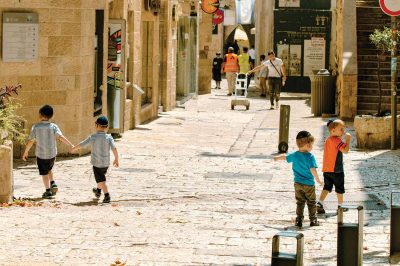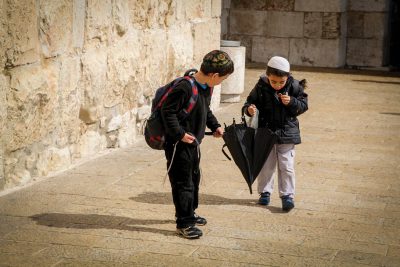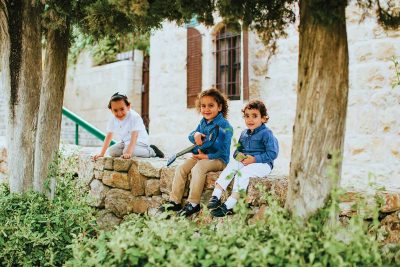
by: Kate Norman, BFP Staff Writer
 Nowadays when we travel, especially internationally, we are warned to be careful of strangers. Beware of pickpockets, chancers and cheats. Be aware of your surroundings. Don’t wear your wallet in your back pocket or carry an open purse. Keep your valuables close to keep them safe. Don’t trust strangers on the street.
Nowadays when we travel, especially internationally, we are warned to be careful of strangers. Beware of pickpockets, chancers and cheats. Be aware of your surroundings. Don’t wear your wallet in your back pocket or carry an open purse. Keep your valuables close to keep them safe. Don’t trust strangers on the street.
This is wise advice—even when traveling around the Holy Land. Israelis are quick to warn you if you’re walking around with your backpack open. Yet as tourists, immigrants and other out-of-towners quickly learn about Israel: this nation has something that others seem to have lost. Despite the conflict, despite the political and religious turmoil, despite the myriad of cultures mixing together, the streets filled with a hodgepodge of native Israelis and immigrants, Gentiles, Arabs, secular Jews, ultra-Orthodox and everyone in between, people in this country treat each other like one big family. They trust each other. We see it every day on the streets of Israel.
One Bridges for Peace volunteer stopped by a tiny corner market after work on a Friday to buy a bouquet of flowers for Shabbat (Sabbath). When she opened her purse, however, she was dismayed to find that she had no cash to pay for the flowers. “Al tidag! Don’t worry about it!” the shop owner told her with a smile and a casual flip of his hand. “Take the flowers and pay me on Sunday or Monday. Shabbat shalom (Peaceful Sabbath)!”
To the logical Westerner, this is no way to run a profitable business—yet this act of kind trust is a surprisingly common practice for shop owners here. Another volunteer shared an experience when she was shopping for a necklace in the Old City of Jerusalem. She found a piece that she liked but couldn’t decide whether it was just what she was looking for. The shop owner told her, “No problem! Take the necklace home, decide if you like it and either bring it back or pay for it later.”
People walking through the streets downtown early in the morning will notice bags of potatoes destined to become crispy French fries sitting outside restaurants and food stands—often hours before the proprietor arrives to open up shop and retrieve the delivery. They don’t worry about the possibility that someone in need (or not) will take advantage of the opportunity and swipe the potatoes.
 This remarkable practice of trust doesn’t pertain specifically to business, either. It permeates every aspect of life in Israel, including public transportation—and not just because we trust the bus drivers with our lives as they audaciously weave in and out of Jerusalem’s chaotic traffic.
This remarkable practice of trust doesn’t pertain specifically to business, either. It permeates every aspect of life in Israel, including public transportation—and not just because we trust the bus drivers with our lives as they audaciously weave in and out of Jerusalem’s chaotic traffic.
Jerusalem commuters trust each other every day on the bus. Mothers hauling strollers and shopping bags with young children, toddlers and babies in tow often rely on perfect strangers to help them lift their stroller and baggage into and out of the bus. Travel-weary people sitting in the back of a crowded bus, rather than elbow their way through the horde of ornery commuters to scan their bus pass, will tap the shoulder of the stranger in the row ahead and pass their card forward, trusting that the card will be passed from person to person until it finds its way to the front, is scanned to pay for the ride and finds its way back to the original card holder. And it always seems to work just fine. It’s simply part of the rhythm on Israeli buses.
Recently, one of our volunteers watched as a man stuck his head into an open bus door to find a kind stranger to take a set of keys and deliver them to another man waiting at the next bus stop.
 What makes the people of Israel put such unflinching trust in each other? Perhaps it is ingrained as a teaching of Judaism. Religious Jewish people often look for opportunities to do a “mitzvah.” In Hebrew it translates to “commandment,” such as the commandments given by God to the ancient Israelites through Moses in the Torah (Gen.–Deut.). The word is often used on the streets of modern-day Israel in the context of a good deed done in joy rather than fulfilled as an obligation. Israelis delight in helping each other. They’re not giving a stranger on the street directions or spare change, they’re helping extended family.
What makes the people of Israel put such unflinching trust in each other? Perhaps it is ingrained as a teaching of Judaism. Religious Jewish people often look for opportunities to do a “mitzvah.” In Hebrew it translates to “commandment,” such as the commandments given by God to the ancient Israelites through Moses in the Torah (Gen.–Deut.). The word is often used on the streets of modern-day Israel in the context of a good deed done in joy rather than fulfilled as an obligation. Israelis delight in helping each other. They’re not giving a stranger on the street directions or spare change, they’re helping extended family.
Israelis also place a high value on life—perhaps because of their history of struggle and persecution as well as their faith. Everyone from a cousin sitting down to the table for Shabbat dinner to a stranger on the street is part of the extended family. Israelis live life ingrained with a we’re-all-in-this-together mindset. Another volunteer said she sometimes sees small children around the ages of 4 and 5 unaccompanied by a parent approach a crosswalk and grab the hand of an adult they clearly aren’t related to. Without a second thought, the children cross the street knowing that hand, no matter whom it belongs to, will see them safely to the other side. It’s not a stranger to be feared or distrusted—it’s simply a member of their extended Israeli family lending another helping hand.
Photo Credit: All photos: bridgesforpeace.com
All logos and trademarks in this site are property of their respective owner. All other materials are property of Bridges for Peace. Copyright © 2025.
Website Site Design by J-Town Internet Services Ltd. - Based in Jerusalem and Serving the World.